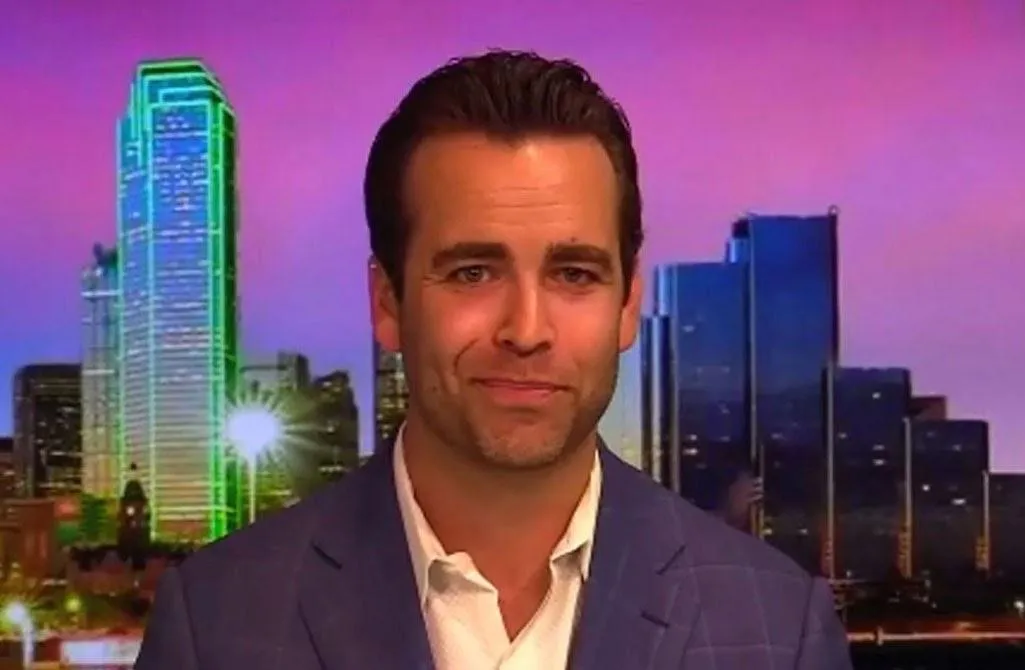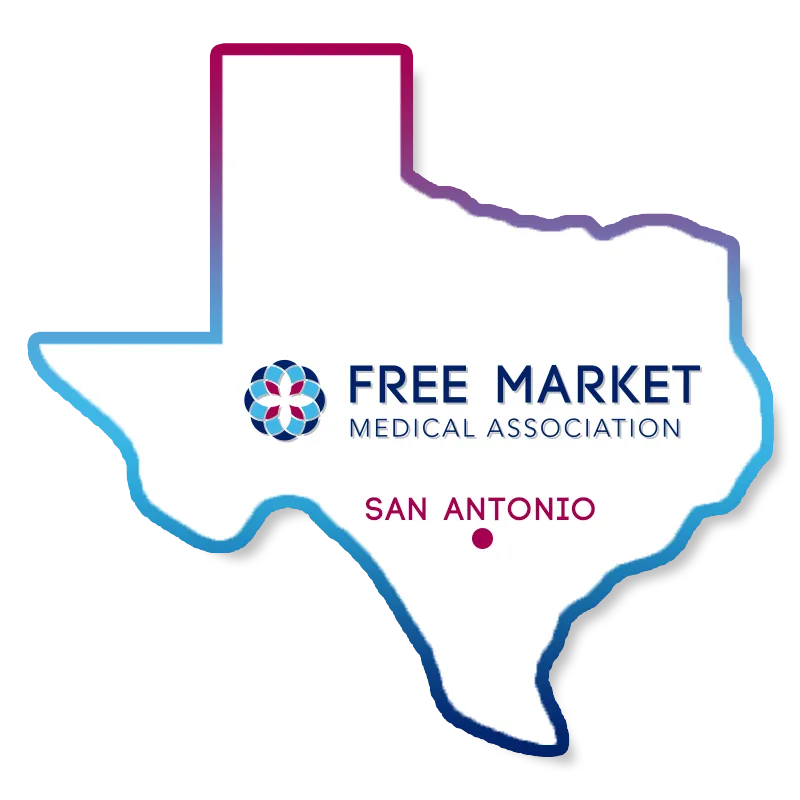Contact Us
sanantonio@fmma.org
Follow Us:
Our Blogs

Seth Denson | San Antonio Free Market Medical Association
Co-founders Shankar Poncelet and Dr. Roger Moczygemba of the San Antonio Free Market Medical Association, host Seth Denson, author of “The Cure; A Blueprint for Solving America’s Healthcare Crisis” in this virtual meeting on the current state of healthcare in America.
A Broken Healthcare System and the Need For Transparency
Seth Denson, aka the “Modern-day Lorax,” believes that unless all Americans become “healthcare entrepreneurs,” not much will change with our broken healthcare system in the United States. His ideal is that our healthcare system would operate like every other aspect of our consumer life, which would include price transparency, understanding, and accountability.
On Tuesday, June 23, 2020, The American Hospital Association lost its legal bid to stop the Trump administration from requiring hospitals to disclose secret rates they negotiate with insurance companies. Even though the fine of $300 per month is minimal, it’s a great first step in the right direction!
Healthcare and Health Insurance are NOT the Same Thing
To start off, it’s very important to differentiate between healthcare and health insurance. Healthcare is the care we get; health insurance is how we pay for the care we get. In two words, our problem in the United States can be summed up when it comes to healthcare; COST and PROFIT. In order to understand how our healthcare system operates, we need to identify where the costs and profits are.
“There is only one way to reduce health insurance premiums, you reduce the number of claims you’re consuming, or the price at which you’re consuming those claims.”~
It’s also important to keep in mind, there are only two types of insurance, self-funded and fully insured; there is no “in between”.
How COVID Is Impacting Insurance
During COVID, the CDC basically declared that any procedure that wasn’t an emergency or life-saving procedure was considered elective, making it difficult for doctors to provide care. This has resulted in a short-term windfall for insurance companies as most Americans, sitting at home, are still paying their health insurance premiums.
So, while the health insurance trend for 2020 might not be too bad, healthcare trend could go up exponentially in 2021. The healthcare industry will be looking for a way to make up for low profits in 2020. Why is that important? If you’re a self-funded employer, you will need to start thinking differently about how your self-funded plan is structured.
“Healthcare trend will be up next year. In turn, health insurance trend will be significantly up two years from now, and so those are the things that you want to start thinking about as you start thinking long-term.”
How COVID Has Impacted Healthcare Delivery
Most likely, and unfortunately, COVID is here to stay. While we can look forward to herd immunity and a vaccine,--this isn’t projected to happen until sometime next year. (2021) What does this mean from the perspective of healthcare? Not a whole lot necessarily,--however, it will impact the way in which we approach the healthcare system.
“Roughly 90% of all APIs, (these are what are called active pharmaceutical ingredients), that go into the drugs that you and I take each and every day, are manufactured in the People’s Republic of China. That should strike fear into anyone in the United States. If China wanted to get really serious about having an overall impact economically or socially in the United States, they could do so without ever firing a shot. They just shut us off from our drugs.”
We must start restructuring how our drug manufacturers operate here in the United States and start looking for other ways to generate APIs! If there has been anything good to come out of the pandemic, perhaps it will serve as a wake-up call not only for our federal government to step in and take action by generating solutions to the API problem, but for every single American to seek to become part of the solution.
Expansion of Telemedicine
Thanks to COVID, telemedicine has finally made it to the frontline, and we’re realizing that doctors can actually use it to successfully help patients without having to see them in an office. Unfortunately, the way our system has been set up, telemedicine has not been encouraged. Someone, somewhere along the way, came up with a “relative value unit” measurement that stated a doctor should be able to see 4 patients an hour,--or in other words, spend 15 minutes per patient.
“As a result of Coronavirus, insurance companies who, by and large, along with Medicare have set RV units, have restructured the way by which doctors can be compensated for their work."
As 90% of all healthcare costs in the United States are generated by 6% of our population, expanding the use of telemedicine can help us achieve two very important goals. First, it can help the 6% access healthcare easier. Second, it can help prevent people from becoming part of the 6% by providing more doctor engagement.
COVID has left us keenly aware of how healthcare is delivered. We’ve been able to think about health care differently and restructure how healthcare is delivered.
If Seth were Czar of Healthcare, He would...
Open up transparency into the healthcare system, and
Eliminate insurance networks.
“Insurance networks provide no intrinsic value to the healthcare system. They create an opaque curtain by which the healthcare system and the health insurance system can be in collusion….What I loved seeing as a result of the situation that we were in is, for a brief moment, nobody was worried about insurance networks, the Javits Center in New York became a makeshift hospital. No one knows today whether or not that was in-network with Blue Cross, United, Cigna, Aetna, insert-name-of-insurance-company-here, and quite frankly, nobody cared. And, that’s the way it needs to be.
In short, while they shouldn’t conflict with each other, healthcare needs to be healthcare, and insurance needs to be insurance, and neither one should interfere with an understanding of the care received or the price paid.
Future predictions for the short term; lower health insurance trend. Long term, however, higher health insurance trend.. Secondary long-term health insurance trend will be higher than the first. As health insurance trends tend to follow healthcare trends, whatever healthcare does today, the health insurance industry will quickly follow."
Solutions
The first step in any solution is recognizing the problem, and the problem here is the actual healthcare. Healthcare is a series of supply chains broken down into four components:
Inpatient services (hospital services)
Outpatient services (i.e. outpatient surgical and physical rehabilitation centers, imaging centers)
Prescription drug industry
Doctors
It’s really important to understand that discounts don’t matter; prices do. This is also why price transparency is of utmost importance. Of the four aforementioned supply chains, the two easiest ones to address are the pharmacy benefit manager on the prescription drug side and the doctor.
“70% of all drugs delivered in the United States are done so through a mechanism of one of three pharmacy benefit managers. They were supposed to be the Sam’s Club and Costcos of the pharmacy industry. Instead, they have become more like the loan shark on the back end where you never know what you’re getting and what you’re paying for. The pharmacy benefit manager is the cash cow for the health insurance industry."
Numerous pharmacy benefit managers in the United States are not linked to any insurance company, so it’s important to do your research and understand the data, the drugs, and how they, (PBMs), operate so you make sure you’re getting the best deal. Also, many pharmaceutical companies offer patient assistance programs where, in certain instances, the drug can be obtained for free. This is especially important to look into if you’re an employer as if your employee gets the drug for free, so do you. You don’t have to use your claims money to pay for it. Also, beware of the new “stupid drugs” which are nothing more than a combination of over-the-counter drugs with a prescription label such as Vimovo, a combination of Nexium and Aleve. Why pay $2,500 when you can buy Nexium and Aleve for a grand total of $15? We have to be more informed, especially as employers. Employees are looking to their employers to help them navigate.
Seth makes the analogy between doctors and “milk in grocery store.” Why? Well, milk in the grocery store is often found in the far back corner and there’s no margin in milk. There’s no margin in being a doctor.
“You may ask, if they’re very thin and there’s no margin, why are hospital systems buying physician practices as quickly as they can and why would a recent financial report show that their average return on investment is eight to one? Because that’s the sales force. The doctor has become the sales force, which is why it has never become more important for you to engage with the doctor.”
Takeaways
90% of healthcare cost is generated by 6% of the population; we’re overspending on 94% of our population. We need to stop and focus resources on the 6% How? By better engagement with doctors. A doctor that you know has no relationship with the hospital and has your employee’s best interests in mind.
The healthcare industry and the insurance industry use two key diversionary tactics: 1) raise deductibles or 2) put in wellness plans.
Healthcare is the one area of our economic sector where cost does not equate to equality.
“The American citizen is not a good consumer when it comes to healthcare. We must help them along and give them the tools to be that. The second thing is everybody is self-funded.” “You need to get engaged with your insurance company whether you’re fully insured or self-funded; start understanding the pool structure. Ask questions! Get them answered! You don’t like the answers? Go find somebody else! That’s the American way. Start being a consumer and acting like it. That’s the only thing that’s going to solve this problem. Don’t be subservient to the industry. Take control of it.”
WEBSITES
Direct Med Clinic on Price Transparency - https://directmedclinic.com/direct-med-clinic-in-san-antonio-express-news-for-price-transparency/
FMMA San Antonio - https://www.sanantoniofmma.org/
FMMA San Antonio Facebook - https://www.facebook.com/SATXfmma
Shop Health - https://shophealth.fmma.org
Seth Denson - https://sethdenson.com/
“The Cure; A Blueprint For Solving America’s Healthcare Crisis”
Seth Denson’s Company, GDP Advisors - https://gdpadvisors.com/
Shankx Web Development - http://shankx.com/
DRUG DISCOUNTS AND INFO
Drugs.com - https://www.drugs.com/discount-card/
GoodRx - https://www.goodrx.com/
Medical Assistance - https://medicineassistancetool.org/
Needy Meds - https://www.needymeds.org/
Rock Pharmacy -https://www.rockpharmacytoday.com
Rx Assist - https://www.rxassist.org/
Script Save - https://www.scriptsave.com
Scriptco - https://scriptco.com
WellRx - https://wellrx.com
REFERENCES
Armour, S. (2020, June 23). Trump administration price-transparency rule covering hospitals upheld. WSJ. https://www.wsj.com/articles/trump-administration-price-transparency-rule-covering-hospitals-upheld-11592945973
Class action targets CIBA insurance as 'Ponzi scheme'. (2018, April 19). PropertyCasualty360. https://www.propertycasualty360.com/2018/04/19/class-action-targets-ciba-insurance-as-ponzi-scheme-414-125761/
Employer-sponsored healthcare revisited. (2019, October 30). Direct Med Clinic San Antonio. https://directmedclinic.com/employer-sponsored-healthcare-revisited/
Luhby, T. (2017, July 27). What was in the failed Senate 'skinny repeal' health care bill? CNNMoney. https://money.cnn.com/2017/07/27/news/economy/senate-skinny-repeal-health-care/index.html
Rep. Chip Roy on H.R. 6690, the BEAT CHINA act. (2020, May 22). Representative Chip Roy. https://roy.house.gov/media/press-releases/rep-chip-roy-hr-6690-beat-china-act
Interview brought to you by Shankx Web Development and Consulting. For more information, please visit http://shankx.com/
The FMMA was founded in 2014 by Jay Kempton and Dr. Keith Smith based on their mutual desire to fix our broken system. They founded the FMMA based on three pillars.
Price is not a product.
Value is mutually determined and requires transparent pricing and quality.
Cash is king, the equality of price is critical.The FMMA connects true buyers and sellers of healthcare, educating and motivating them to work together based upon a mutually beneficial relationship built on the pillars.
To learn more, contact sanantonio@fmma.org.

Follow Us
Follow Us
© Copyright 2024. San Antonio Free Market Medical Association. All rights reserved. Site by SHANKX.
